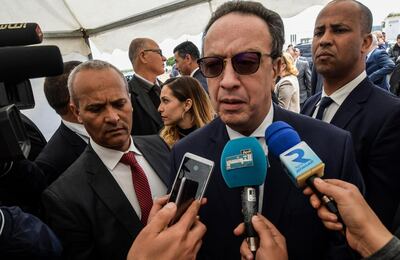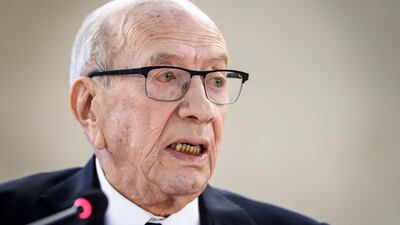Tunisian President Beji Caid Essebsi's Nidaa Tounes party splintered again at the weekend, dealing another setback to his efforts to rally secular forces for parliamentary elections this year.
Rival factions of Nidaa Tounes held separate congresses in the coastal resort of Monastir, with each electing a party leader on Saturday. One congress chose Sofian Toubel, an MP, as head of the party's central committee on Saturday, while the other picked the president's son, Hafedh Caid Essebsi, a polarising figure who has been blamed for previous splits in the party.
“The congress of Monastir [which supported Hafedh Caid Essesbi] is illegal and an attempt to deflect legitimacy," party official Ons Hattab told Reuters.
For his part, Hafedh Caid Essebsi denied the accusations and expressed surprise over the behaviour of some leaders who attended a parallel conference, cautioning that this could affect the future of the party.
However, President Caid Essebi's decision to withdraw from politics before this year's elections looks likely to curtail, or at least undermine, his son's controversial time in the political spotlight.
Despite his past association with the autocratic regime of Zine El Abidine Ben Ali that was toppled in 2011, the elder Caid Essebsi has established himself as a major post-revolutionary figure in Tunisian politics. After winning the first constitutionally mandated elections in 2014 he went on to forge a presidency cast very much in his own image. In the face of high unemployment, social unrest and devastating terrorist attacks, Mr Caid Essebsi kept Tunisia on a democratic course underpinned by his championing of women's rights and secular reform.
Mr Caid Essebsi set up Nidaa Tounes in 2012 as a counterweight to the moderate Islamist party Ennahda, but it has since suffered a succession of splits that academics and analysts blame largely on his son, who served as its executive director.
Despite never having been elected to public office, Hafedh, 57, has established himself as a prominent figure in Tunisian politics. But he has yet to prove himself a popular one. In July last year, he polled last in a Sigma Council survey on the approval ratings of the country’s political leadership.
Other surveys have indicated that President Caid Essebsi's loyalty to Hafedh may have damaged his own public standing. Prominent members of Hafedh's inner circle include the former Nidaa Tounes political affairs officer, Borhen Bsaies, pardoned by the president last year after being convicted of corruption, and the party’s former secretary general, Slim Riahi, who is on an extended business trip to Europe after accusing Prime Minister Youssef Chahed and others of attempting a coup against the president, charges later dismissed by the courts.
However, with Mr Caid Essebsi's exit from the presidency now imminent, his son's role in the corridors of power also looks to be near an end.

"When Beji Caid Essebsi retires from politics, I think it will all but end Hafedh Caid Essebsi's political career," Sharan Grewal, a postdoctoral research fellow in the Centre for Middle East Policy at Brookings told The National. "He is where he is because of his father. His desire to control Nidaa Tounes at the expense of fracturing the party is the primary cause of how a party that won the 2014 elections with 86 seats in the parliament is now in third place with 40 seats."
The president's son “not only failed to stem the exodus from Nidaa but actively caused it, and I think that makes it unlikely that he will continue as executive director of the party once his father leaves politics," Mr Grewal said.
Always a contentious figure, the scale of Hafedh's ability to divide became clear during a 2015 meeting of the party's executive bureau, when gangs alleged to be acting under the direction of the president's son physically prevented the party's general secretary, Moncef Marzouk, and others from attending. Mr Marzouk left the party along with a considerable cohort of parliamentary deputies and established his own, the centrist, secular Machrouu Tounes, in 2016.
The younger Caid Essebsi's fractiousness was also evident in his rivalry with the prime minister. Mr Chahed's membership of Nidaa Tounes was suspended in September, a few months after he accused Hafedh of "destroying" the party. Mr Chahed also went on to found his own party, Tahya Tounes, in January.
"Hafedh has progressively strengthened his position in the party," said Hamza Meddeb, a research fellow at the European University Institute in Florence who specialises in Tunisian affairs. "This has come with a cost of divisions and tensions. Hafedh is clearly not a politician able to preserve the unity of the party. He has no political experience, no clear ideas and positions."
Ennahda, Tahya Tounes and the Nidaa Tounes rule Tunisia in a coalition but infighting has hampered its decision-making and the implementation of economic reforms demanded by foreign donors.
With the next parliamentary election due in October, President Caid Essebsi appears to be trying to once again strengthen secularist ranks against Ennahda, which is expected to poll highly. At the Nidaa Tounes congress this month where he announced his decision not to stand again, Mr Caid Essebsi called for an end to the party’s internal feuding and for Mr Chahed's reintegration. The offer was politely declined by the prime minister. The president also met Mr Marzouk at the presidential palace in Carthage on Thursday, with the need to "unify the national ranks" among the topics discussed.
For now, Nidaa Tounes remains fractured and with it, the secular vote. Moreover, while a number of prominent figures remain with the party and continue to support the president's son, they must, according to Dr Grewal, "recognise how polarising of a figure he is, and how unpopular he is among the public.
"Hafedh cannot continue to be their public face if the party is to survive."

